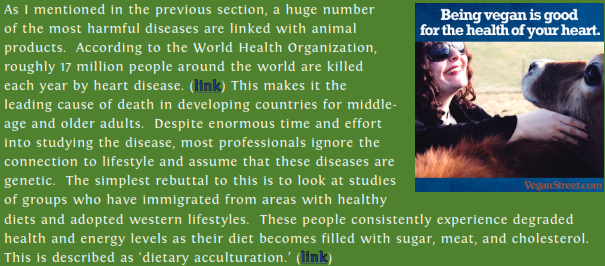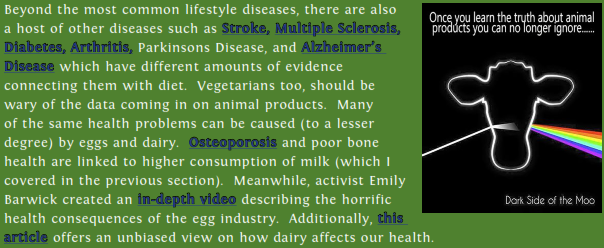Physical Health

studies around the world link unhealthy lifestyle choices like consumption of animal products with disease. (link) (link) (link) Yet strangely, doctors and medical experts rarely tell us about healthy nutrition. This is because, like carfree lifestyles, there is less profit in preventing sickness. We’ve all heard commercials telling us to ‘ask your doctor if ‘X’ drug is right for you.’ How many of us though, have heard a commercial applauding the medical benefits of lentils? Sadly, the medical doctors and experts that we trust to learn about health, actually have next to zero required coursework in nutritional health. It’s therefore up to us to understand this relationship, with the help of people like Dr. Michael Greger.

Heart disease

Cancer

On the other hand, it’s important to remember that the single most deadly form of cancer is lung cancer which is caused by industrial pollution, cigarettes, and the burning of fossil fuels. (link)
To add another layer, several studies have linked traffic noise and stress with heart attacks, and circulatory disease. There is a very large body of evidence linking the pollution from traffic-filled roads with cancer in both children and adults. This brings up one of the main reasons for this site. While some of you might eat a vegan diet, and others might be car-light or (hopefully) carfree, only a very small number are both. I hope that this information will help you to see the value in both choices.

Other Diseases

There’s some disagreement in the research as to whether animal products are the main cause or just a contributing factor. This depends on which disease, how much meat is consumed relative to whole grains, and the amount of exercise a person gets. What IS clear, is that ever increasing numbers of health professionals are speaking out about the benefits of a meat-free diet as part of a longer and more healthy life

CARnage

that internationally, “tens of millions of people are injured or disabled on the roads each year.” It’s with blatant irony therefore, that I hear people regularly speak of the fear they have with traveling outside of a car. This belief is partly due to a number of issues including social pressure, poor awareness, and a heavily biased transportation system.
So why is it that so few people take steps to reduce this horrific CARnage? Well the answer to that is quite simple - it’s always the other person’s fault.
As humans we tend to see ourselves as more skilled then the average person without any outside proof. One study found that 673 out of 909 motorists believed that they were better than the average driver. (link)
But obviously we can’t ALL be better then average. So what allows people to have such a contradictory view? Well the answer turns out to be pretty comlex. You can read the full study or the more abridged article here.
To put it briefly, there’s no universal definition for a ‘good driver.’ Some think that being able to balance a phone conversation with traffic makes them ‘good’ while others might conveniently forget their own speeding only to focus on someone else’s.
Ironically, of the people who I’ve spoken with, the minority who are most aware of the huge responsibility to be careful are those who regularly travel by bicycle. In my own experience, the vulnerability of traveling without a reinforced steel safety cage teaches us to be more attentive and avoid distractions.
In addition, this study from the university of Copenhagen found that the physical activity associated with bicycle transportation reduces a person’s chance of death by 40%.
Other Hazards















